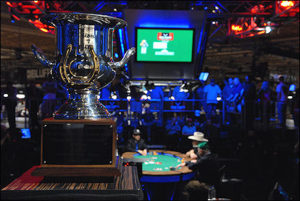INITIAL IMPRESSIONS OF THE INTERNET GAMBLING PROHIBITION …POKER PROF
I’ve read through the online gambling prohibition (starts on page 213 and is used for all page – line number references) several times now and below are my initial impressions and thoughts. I’ve attempted to paraphrase some of the sections and quote the items that caught my eye to provide some plain English bites of the bill. I have intentionally ignored the included exceptions provided for Indian Gaming, Lotto’s and Horse Betting since my primary point of interest is how it will impact online gambling and particularly online poker.
The actual impact of this legislation won’t be known until the policies and procedures for regulation and enforcement are completed and this will happen during the 270 days after this is signed into law (Could happen as soon as October 4th). Even then, the impact won’t be known in full until the judicial branch has a few cases on which to write opinions and interpretations of the scope and, perhaps, Constitutionality of the legislation.
The legislation is divided into 7 sections:
1. 5361 Congressional Finding and legislative intent (pg 213)
2. 5262 Definitions (pg 214 line 18)
3. 5363 The Criminal Statute (pg 230 line 1)
4. 5364 Policies and Procedures to identify and prevent transactions (pg 231 line 5)
5. 5365 Civil Remedies (pg 236 line 3)
6. 5366 Criminal penalties (pg 241 line 15)
7. 5367 Circumvention prevention (pg 242 line 4)
The Congressional findings simply state that, “Online gambling is a problem recognized and one of the suggested methods for curbing the industry is through legislation to prohibit fund transfers to online gambling sites and the banks that represent them,” (pg. 213 line 20), these are the finding of Congress, not the actual law.
Under the definitions section a couple of items of note. First, the official US definition for ‘unlawful internet gambling’ is now codified as:
“to place, receive, or otherwise knowingly transmit a bet or wager by any means which involves the Internet where such bet or wager is unlawful under any applicable Federal or State Law in the State or Tribal Lands in which the bet or wager is initiated, received or otherwise made.” (pg 221 line 13)
A ‘restricted transaction’ is defined as:
“any transaction or transmittal involving any credit, funds, instrument, or proceeds described in any paragraph of section 5363 which the recipient is prohibited from accepting under 5363”. (pg 221 line 1)
‘Business of Betting or Wagering’ DOES NOT include the activities of a financial transaction provider or any interactive computer service or telecommunications service. (pg 219 line 12) What’s interesting here is what exactly is included isn’t specified.
The first set of teeth in the legislation comes from the criminal statute 5363:
“Prohibition on acceptance of any financial instrument for unlawful internet gamblingNo person engaged in the business of betting or wagering may knowingly accept…[payment related to gambling over the Internet]” (page 230 line 1)
This criminalizes an individual “in the business of betting and wagering for accepting or initiating a transfer of funds for the purpose of gambling online”. Note that based on the language of the definitions “interactive computing services” and financial intuitions are given express immunity from this section.The policies and procedures will be drafted by the Secretary and Board or Governors of the Federal Reserve. They are ordered to institute policies that:
A. Create codes and other means to identify gambling transactions
B. Block transactions reasonably believed to be restricted
C. Create alternate means for identification and blocking of restricted transactions
D. Identify the unreasonable scenarios and exempt/exclude them
Given the broad scope of the mandate of these procedures anything could come from this.
Under the Civil section 5365 “the district court of the United States shall… prevent and restrain restricted transactions by issuing appropriate orders in accordance with this section, regardless of whether a prosecution has been initiated under this subsection” (pg 236 line 5)
Interactive Computer Services have quite a bit of lauguage devoted to the scope of it’s obligations
1. It’s limited to disabling access to the site that is in violation of section 5363. (I’m not clear on the scope of this language)
2. Must be notified of the have a chance to appear
3. DOES NOT impose an obligation to monitor the service for this type of activity . Meaning action should only be expected to occur after the Fed’s mount a case.
The Criminal penalties include fines and up to five years in prison.
The final section is a loop-hole closure that prevents a person from taking the definition exception to the criminal portion of the statute found at 5362-2 (pg 219 line 12).
Other Articles of Note:
Slashdot
C-Net
Eye on Gambling
Up For Poker







 Beranda
Beranda
 Whatsapp
Whatsapp
 Daftar
Daftar
 Promosi
Promosi
 Telegram
Telegram